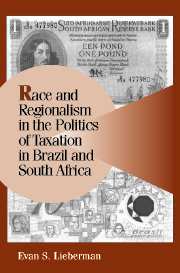Book contents
- Frontmatter
- Contents
- List of Figures and Tables
- Acknowledgments
- Abbreviations
- 1 THE POLITICS OF TAXATION
- 2 THE TAX STATE IN COMPARATIVE PERSPECTIVE
- 3 CRITICAL JUNCTURE: DEFINING NATIONAL POLITICAL COMMUNITY
- 4 THE RISE OF THE MODERN TAX STATE IN BRAZIL AND SOUTH AFRICA
- 5 SHADOWS OF THE PAST: TAX REFORM IN AN ERA OF GLOBALIZATION AND DEMOCRATIZATION
- 6 POLITICAL COMMUNITY AND TAXATION BEYOND BRAZIL AND SOUTH AFRICA
- 7 CONCLUSION
- APPENDIX: COMPARATIVE-HISTORICAL ANALYSIS
- References
- Index
- Titles in the series
6 - POLITICAL COMMUNITY AND TAXATION BEYOND BRAZIL AND SOUTH AFRICA
Published online by Cambridge University Press: 22 December 2009
- Frontmatter
- Contents
- List of Figures and Tables
- Acknowledgments
- Abbreviations
- 1 THE POLITICS OF TAXATION
- 2 THE TAX STATE IN COMPARATIVE PERSPECTIVE
- 3 CRITICAL JUNCTURE: DEFINING NATIONAL POLITICAL COMMUNITY
- 4 THE RISE OF THE MODERN TAX STATE IN BRAZIL AND SOUTH AFRICA
- 5 SHADOWS OF THE PAST: TAX REFORM IN AN ERA OF GLOBALIZATION AND DEMOCRATIZATION
- 6 POLITICAL COMMUNITY AND TAXATION BEYOND BRAZIL AND SOUTH AFRICA
- 7 CONCLUSION
- APPENDIX: COMPARATIVE-HISTORICAL ANALYSIS
- References
- Index
- Titles in the series
Summary
To what extent have the politics of race and regionalism influenced the development of the tax state in countries other than Brazil and South Africa? Extending the geographic scope of the analysis to countries around the world provides opportunities to explore the general applicability of the political community model, and to gain additional analytic leverage over the comparison between these two countries. While it is not possible to carry out the type of detailed historical analysis presented in the previous chapters for additional country cases, we can estimate statistical relationships between key independent variables and various taxation measures in order to assess the theoretical reach of the arguments advanced above. This return to the “large-N” analysis, which originally helped to frame the central puzzles of this book, represents an attempt to deploy a nested research design, taking advantage of multiple research strategies. It reflects a belief in the multiple purposes of social science research, which includes both the development of general theories and the elucidation of historically specific places and time periods that are of particular interest. Every approach has its limitations, and the use of multiple methods helps to compensate for the shortcomings of any single approach used in isolation.
Before proceeding with such analysis, however, it is useful to review the main conclusion from the previous chapters.
- Type
- Chapter
- Information
- Publisher: Cambridge University PressPrint publication year: 2003



